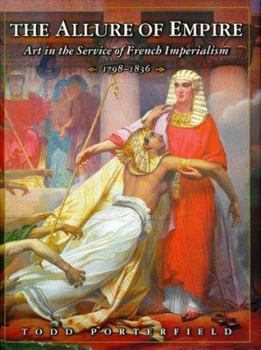The Allure of Empire: Art in the Service of French Imperialism, 1798-1836
From monumental battle paintings to the public display of archaeological spoils to the decoration of urban vistas, visual culture promoted modern French imperialism. So argues Todd Porterfield in this provocative look at the forces of art and politics in France's military conquest of the Near East. In challenging the conventional wisdom that France happened into imperial venture, Porterfield explores interactions among artists, generals, journalists, curators, and politicians from the time of Napoleon's Egyptian campaign to the invasion of Algeria during the Restoration and July Monarchy. Together they forged an official culture that provided a rationale for imperialism--based on images of France's moral and technological superiority--and an enduring project for Frenchmen of all political persuasions during an era of domestic instability. The allure of empire derived in part from its function as an alternative, surrogate, mask, and displacement of the Revolution. Porterfield reveals the interlocking strategies, the historical, scientific, moralistic, and gendered judgments, that imperial art conveyed in a strikingly rich variety of media: the obelisk at the Place de la Concorde, battle paintings of the Egyptian campaign, the first Egyptian Museum in the Louvre, and Delacroix's Women of Algiers . Not only do his analyses engage a wide range of urgent debates within cultural studies, but they also shed light on a troubling question. How in the age of libert, , egalit, , and fraternit, was visual culture enlisted to fabricate a sense of national superiority that led to the subjugation of others?
Format:Hardcover
Language:English
ISBN:0691059594
ISBN13:9780691059594
Release Date:November 1998
Publisher:Princeton University Press
Length:232 Pages
Weight:2.50 lbs.
Dimensions:1.1" x 7.8" x 10.3"
Customer Reviews
0 rating





